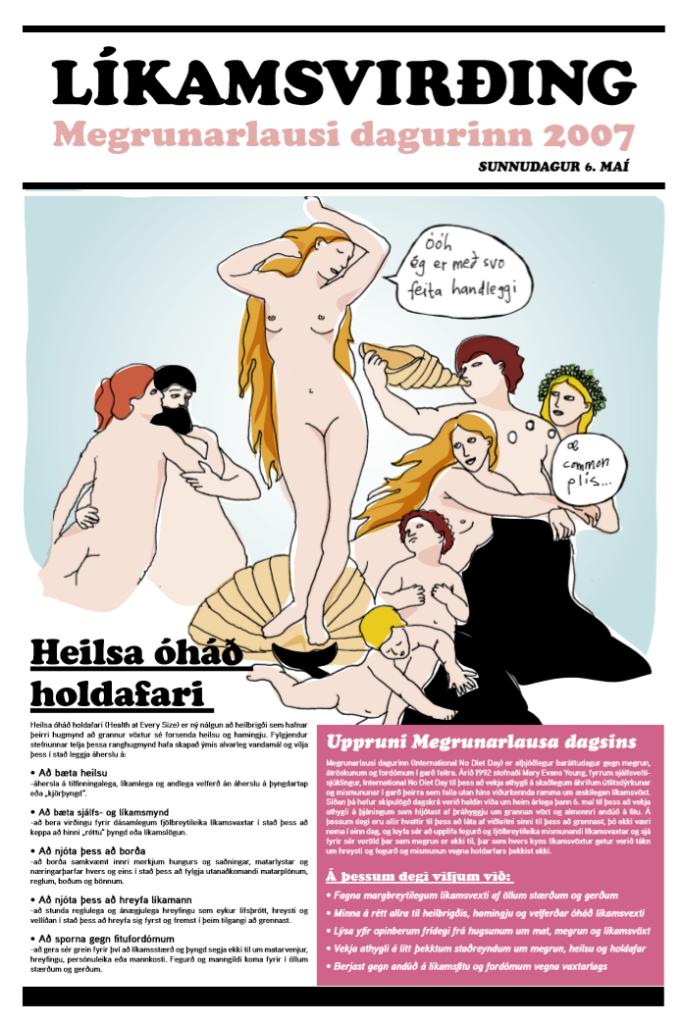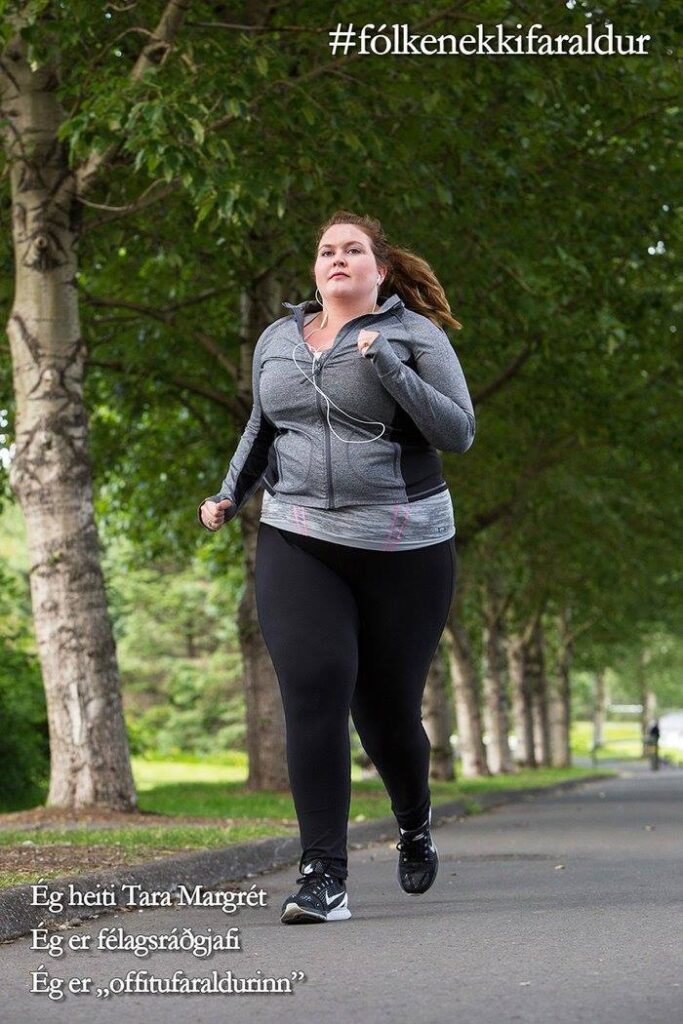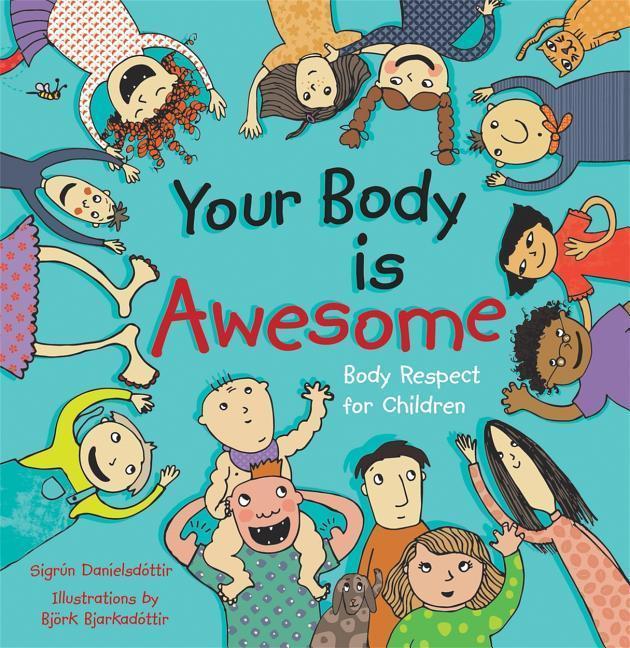Body Respect Switzerland is created after the model of Body Respect Iceland.
Sigrún Daníelsdóttir is the founder of the Body Respect movement in Iceland. She was a keynote speaker at Health Promotion Switzerland’s Healthy Body Image forum in 2019. As Melanie started Yes2Bodies few months earlier, she attended the forum for Sigrún’s talk. Melanie was so excited about Iceland’s activism that it quickly became clear: Switzerland also needs an annual Body Respect day.
The Body Respect Switzerland association will be launched on March 13, on Iceland’s Body Respect Day. And we very much hope to celebrate an annual event and hopefully in-person events in the years coming.
Melanie and Sigrún are in regular contact and in December, they met online and Sigrún talked about the history of Body Respect Island.
Sigrún Daníelsdóttir lives and works in Iceland in Reykjavik. She is a clinical psychologist (Cand.Psych / M.Sc) and works in the management of mental health promotion and prevention at the Directorate of Health in Iceland, as a Project Manager for Mental Health Promotion. She is a long time member of the Academy for Eating Disorders.
The beginning of activism in Iceland
Sigrún’s start into activism was a gradual thing. „I guess the way you start is by becoming aware of the different forms of social injustice.“
When she was studying to become a psychologist, she was already very interested in issues around Body Image, Eating Disorders and the social construction of weight.
„And that has its roots in my own personal experience. I was a heavier child and experienced a lot of negative reactions to that, teasing and bullying from peers, negative comments from adults and things like that. As I understand my own personal history, I developed an eating disorder as a result of that. Having – from a young age – the messages that my body was not acceptable and that it was ugly and really just stood in the way of being probably acknowledged as an okay person. So I developed, as lots of people do, a very negative and even hateful relationship with my body.“
„It became my mission over my youth to change it, to become acceptable, and that ended in many years of battle with anorexia and bulimia.“
When she was recovering from her Eating Disorder and pregnant with her first child, Sigrún was studying psychology at the University. She began to read a lot of materials relating to body image, social cultural attitudes, weight and eating disorders. She also got involved with the Academy for Eating Disorders. The academy offered an email discussion list. where a lot of debate was going on around how we think about weight, the approaches we take towards changing or accepting diversity and weight.
„That was really inspiring to me and was the first time I encountered any kind of intellectual debate and discussion around these issues, which I had always seen as unquestionable truth, and not as something that society has created.“
In the early 2000s, around 2002- 2005, she was already immersed in these challenging ideas around the social meaning of weight.
„And there’s something that happens with your newly awakened understanding of things: there’s a huge discrepancy or mismatch between the way apparently everybody is thinking about this thing, and the way you have realized the different side of the story. As time goes on, it becomes increasingly urgent for a person to speak up about these things and to try to influence the society around them“, Sigrún remembers her process.
She graduated as a psychologist in 2005 and started working in Child and Adolescent Mental Health and was soon involved in the eating disorder treatment team at the Iceland main hospital for Child and Adolescent Psychiatry. She was meeting young kids with problems that in one way or another can be linked to how they have learned to think about their bodies. „It became a pressing need to do something about it!“
Yearly activism at the International No Diet Day
Sigrún had heard before about the International No Diet Day on May 6.
„I thought to myself that this would be a good place to start, because it’s only one day out of the year and at that time, there was no movement here in Iceland.“
In 2006, Sigrún started organizing the International No Diet Day. „At first I collaborated with the Icelandic Feminist Association. I also had an excellent artist who I worked with for a few years. It was no real form of movement, it was mostly focused on this one day every year, but we tried to do different things“.
Introducing a new term: Body Respect

Over the years, they had different campaigns. The first year was a symposium with presentations and talks about diet culture. One year, a little magazine was distributed inside Iceland’s main newspaper, so that on the International No Diet Day in 2007, every household and office in Iceland received a copy of this magazine.
„This was the first time the term Líkamsvirðing, that means Body Respect in Icelandic, was presented. There wasn’t an already existing word in our language to use and I wanted to find a way to present what I was fighting for, not what I was fighting against. So that’s how the term Body Respect came into being.“
In 2009 Sigrún started a Blog under the same name and that’s when things really started to grow. From just being a one-day event to becoming a constant open social dialogue. Sigrún was very active on the Blog and soon people who were inspired and interested in joining the fight started contacting her. New authors came into the blog and when it was most active it had seven authors contributing to the blog a few times a week.
„The blog became very well known in Iceland and in 2010 it was voted one of the most popular blogs.“
Body Respect slowly became a known topic in Iceland. „I remember when I started to see people I didn’t know, complete strangers all over the country to use the Body Respect terminology. It had arrived outside our activist bubble in the mainstream audience.“
Body Respect Association
In 2012 the Icelandic Body Respect Association was founded and in 2014, Iceland celebrated the first national Body Respect Day. „We switched from celebrating the International No Diet Day to the National Body Respect Day and that was a very conscious decision: Because it’s much more fun and much more productive to stress the point of what you are fighting for, than what you’re fighting against. Also, we wanted to move past the focus on diet culture to highlight weight and embodiment as a human rights issue.“
The No Diet Day sometimes led to misunderstandings and sarcasm: „’I ate hamburgers today, because it’s No Diet Day’ or something like that. Having like a single day you’re taking a break from the normative mentality of diet culture. That wasn’t our goal. Our focus was to increase respect and acceptance for all bodies, including the relationships to our own bodies!“

A few years later, in 2017 there was a change in the management: „I stepped down as the president of the Icelandic Body Respect Association. Tara Margret Vilhjalmsdottir, a fat activist who was very vocal and has shown incredible courage in light of the fact that she had tremendous negative reactions to her activism and herself as a fat person, became president. It was really interesting to see the difference in who is speaking.“
Sigrún is a straight size person and Tara is a fat person. „In a campaign with photos of diverse fat people, the new president of the Icelandic Body Respect Association participated and her picture showed her running outside doing exercise. She had the picture as her Facebook profile for a while and had tons of negative feedback. Strangers sending her messages on Facebook. Like how dare you present yourself in this way. That she is creating a false image of herself as a healthy person. It has been really horrifying to see the difference in who conveys the message.“
Body Dissatisfaction in Kids
In last year’s UNICEF Report about the Health of Children and Adolescents, the numbers showed that Iceland has the least body dissatisfaction with 33%, with the highest being 55% in Poland. Switzerland is below average with 47% and far behind Iceland.
Melanie: Do you think this positive result has to do with all the activism in Iceland?
Sigrún: „That’s a question that is very difficult to answer. We don’t really know about what drives changes like these over time, but I think that it’s reasonable to think that it had some impact. Like I said, we do have increased awareness. I think over the past 10 to 15 years, people in Iceland really have a more critical public dialogue and are thinking about these things more than they did before. For example, it is widely accepted that it’s bad for kids to feel negative about their bodies and it’s a risk behavior if they are dieting. It was common for heavier kids to be encouraged to diet before but I don’t think anybody would do that today.
Your Body Is Awesome: Body Respect for Children
The role of parents, teachers and other adults regarding children’s bodies is very important. Sigrún’s children’s book „Your Body Is Awesome: Body Respect for Children“ contains an afterword for parents: To accept children’s size and support them in respecting their size.
Melanie: „It is my wish that every parent and every school has a book like this available.“
Sigrún: „If a publisher is interested, I’m happy to have it published in German.“

Reykjavik Human Rights Policy including Body Build and Size
A huge achievement, and very unique in Europe, is Reykjavik’s Human Rights Policy. In 2016 the category weight was included.
„The centennial marking women’s suffrage in Iceland drove a political opportunity to focus on problems marginalized groups frequently encounter and the importance of a human rights policy – which was already under preparation in the City – as a locus for developing antidiscrimination protections. Finally, the fact that Reykjavik hosted an important international conference on weight stigma that city officials attended opened up space for discussion on policy mechanisms to remedy weight stigma. These three streams converged to create a policy window for explicit protections against weight discrimination in the Reykjavik Human Rights Policy, the proponents of which encountered virtually no resistance in their efforts.“
Meadows, Daníelsdóttir, Goldberg & Mercedes (2020)1
Sigrún explains: „Reykjavik is by far Iceland’s largest municipality and a large portion of the population lives there. The policy they try to live and work by affects a lot of people. It’s just like their own motives they set for themselves and that they wanted to operate on. What values they want to see in their schools, how they are creating local activities, social services and of course the Municipality of Reykjavik is also a work place. It’s the largest workplace in the country, so when they set the policy that addresses how they want to treat their employees, that also has a lot of impact. While it is not a legal document and it does not convey legal protection, it still is a public authority that has made a public commitment to working towards the respect of body diversity and working against any kind of prejudice or discrimination or injustice in its services and itself as an employer.“
Melanie: „Do you see some change to how fat people are treated and do you see more inclusion in workplaces for example, with wide enough chairs available and things like that?“
Sigrún: „I don’t think it has been measured but I think it’s an interesting question about how Reykjavik is assessing the impact of their policies. And the policy of course it’s not just about weight, it’s about national origin, age, gender, sexuality, disability; many different social justice issues. It will be interesting to know how they are following it and if they’re systematically tracking whether they really do have the positive impact they aim for. The policy also creates the venue for citizens themselves to assert their rights. For example, if I live in Reykjavik and if I as a parent with children in school experience that my child was discriminated against because of their size, or the school has harmful messages around food. As a citizen of Reykjavik, I could probably use the human rights policy and show that it goes against the policy that has been accepted by the city council.“
Thank you Sigrún for sharing your story and for all the activism and awareness raising you do all the time. The Icelandic activism is a huge inspiration and I hope Switzerland will learn from the progress other countries already worked through.
We will stay in touch with the Iceland Body Respect Association and with Sigrún.
Body Respect Island on Facebook:
https://www.facebook.com/likamsvirdingarsamtok/
- 1.Meadows A, Daníelsdóttir S, Goldberg D, Mercedes M. Fighting for a (wide enough) seat at the table: weight stigma in law and policy. Fat Studies. Published online November 9, 2020:1-24. doi:10.1080/21604851.2020.1835295